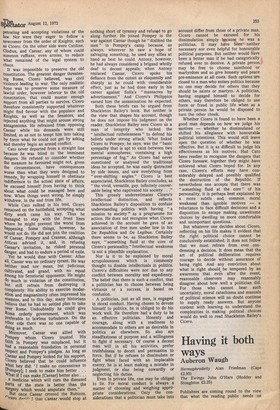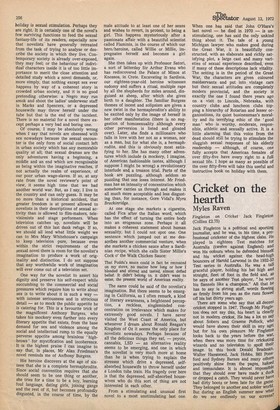Having it both ways
Auberon Waugh
Hermaphrodeity Alan Friedman (Cape £2.95) The Ewings John O'Hare (Hodder and Stoughton £2.25) Publishers are coming round to the view that what the reading public needs on holiday is sexual stimulation. Perhaps they are right. It is certainly one of the novel's few surviving functions to feed the sexual fantasy-life of its readers, especially now that novelists have generally retreated from the task of trying to analyse or describe the society in which they live. Contemporary society is already over-exposed, they may feel; or the behaviour of individual characters inside it is of too little importance to merit the close attention and detailed study which a novel demands, or, more simply, that nothing except sex ever happens by way of a coherent story in crowded urban society, and it is no good pretending otherwise: a Negro may run amok and shoot the ladies' underwear staff in Marks and Spencers, or a depressed housewife may throw herself under the tube but that is the end of the incident. There is no material for a novel there except perhaps a very bad and boring one.
Of course, I may be absolutely wrong when I say that novels are obsessed with sex nowadays because the sexual encounter is the only form of social contact left in urban society which has any memorable quality at all; that sexual dramas are the only adventures having a beginning, a middle and an end which are recognisable as being within the imaginative reaches, if not actually the realm of experience, of our poor urban wage-slaves. If so, at any rate from the novel reviewer's point of view, it seems high time that we had another world war. But, as I say, I live in the country and can only guess. It may be no more than a historical accident, that greater freedom is at present allowed to novelists in their descriptions of sexual activity than is allowed to film-makers, televisionists and stage performers. When television catches up, novelists will be driven out of this last dank refuge. If so, we should all lend what little weight we can to Mrs Mary Whitehouse's campaign to keep television pure, because even within the strict requirements of the sexual novel there is room for the novelist's imagination to produce a work of originality and distinction. I do not suppose that any worthwhile work of imagination will ever come out of a television set.
One way for the novelist to assert his dignity and preserve his self-respect while succumbing to the commercial and social pressures which require him to write about sex is to write about it in such a way — with intense seriousness and in atrocious detail — as to mock the public appetite he is catering for. This is a favourite trick of the magnificent Anthony Burgess, who takes his mockery even further into every literary appetite that exists, from the base demand for sex and violence among the social and intellectual rump to the equally perverse appetite among brainless ' highbrows ' for mystification and incoherence. It is the highest praise I can imagine to say that, in places, Mr Alan Friedman's novel reminds me of Anthony Burgess.
His heroine discovers at the age of sixteen that she is a complete hermaphrodite. Since social convention requires that she should seem to be one thing or another, she tries for a time to be a boy, learning foul language, dating girls, joining gangs and the rest of it, but becomes profoundly disgusted, in the course of time, by the male attitude to at least one of her sexes and wishes to revert, in protest, to being a girl. This happens mysteriously after a passionate affair with a beautiful scientist called Flaminia, in the course of which our hero/heroine, called Willie or Millie, impregnates herself and becomes a girl again.
She then takes up with Professor Satori, a sort of latterday Sir Arthur Evans who has rediscovered the Palace of Minos at Knossos, in Crete. Excavating in Sardinia, our eighteen-year-old heroine witnesses sodomy and suffers a ritual, multiple rape by all the shepherds for miles around, disguised as sheep, after which she gives birth to a daughter. The familiar Burgess themes of incest and solipsism are given a new twist in the hermaphrodite's ability to be excited only by the image of herself in her other manifestation (there is no suggestion of homosexuality although every other perversion is listed and gloated over). Later, she finds a millionaire who falls in love with her not as a woman, nor as a man, but for what she is, a hermaphrodite, and this is obviously most satisfying to her. She has many other adventures which include (a mockery, I imagine, of American fashionable tastes, although I suppose I might be wrong) a revolutionary interlude and, a treason trial. Parts of the book are puzzling, although seldom so puzzling that one loses interest. Mr Friedman has an intensity of concentration which somehow carries us through and makes it all much more acceptable and less disgusting than, for instance, Gore Vidal's Myra Breckinridge.
At one stage she markets a cigarette, called Fica after the Italian word, which has the effect of turning the entire body into an erogenous zone. Perhaps it all makes a coherent statement about human sexuality, but I could not spot one. One sentence which jumped out at me desscribes another commercial venture, when she markets a chicken sauce after a Sardinian recipe, which she calls Sister Millie's Cock o' the Walk Chicken Sauce: That Puddu's sauce could in fact be recreated on my stove, no matter how long or how I blended and stirred and tasted, almost defied belief. It didn't belong to, it didn't want to enter, the present world of American reality.
The same could be said of the novelist's imagination. But there seems to be emerging in California, as I often remark, a kind of literary awareness, a heightened perception, a reckless, singleminded concentration on irrelevance which makes for extremely good novels. I have never visited the West Coast of America, but whenever I dream about Ronald Reagan's Kingdom of Oz it seems the only place for novelists nowadays. Perhaps because of all the delicious things they eat, — peyote, cannabis, LSD — an alternative reality seems to be emerging, and one in which the novelist is very much more at home than he is when trying to explain the stresses which drive a depressed, selfabsorbed housewife to throw herself under a London tube train. His tragedy over here is that the depressed, self-absorbed housewives who do this sort of thing are not interested in each other.
From a stimulating and unusual first novel to a most unstimulating last one. When one has said that John O'Hara's last novel — he died in 1970 — is unstimulating, one has said the only unkind thing about it. The tale of a young Michigan lawyer who makes good during the Great War, it is beautifully constructed, with an elaborate and richly satisfying plot, a large cast and many varieties of sexual experience described, even if many of these descriptions lack vitality. The setting is in the period of the Great War, the characters are given coloured maidservants and put into vintage cars but their sexual attitudes are completely modern provincial, and the society is exactly the one I found there years ago on a visit to Lincoln, Nebraska, with country clubs and luncheon clubs topping a hierarchy of Rotarian and lesser organisations, its quiet businessman's morality and its terrifying ethic of the 'good man' who is worthy, moderate, responsible, athletic and sexually active. It is a little alarming that this voice from the dead should still be trying to stimulate the sluggish sexual responses of his elderly readership — although, of course, one fully accepts that American females of over fifty-five have every right to a full sexual life. I hope as many as possible of the over fifty-fives will take this useful and instructive book on holiday with them.



























 Previous page
Previous page